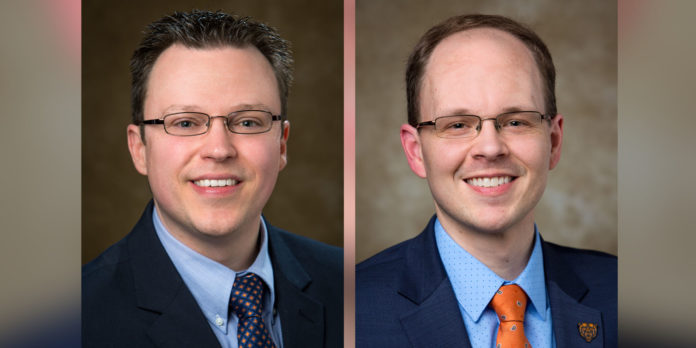MACON – Mercer University School of Medicine (MUSM) professors Dr. Bryant Smalley and Dr. Jacob Warren received a $1,000,000 grant from the federal Health Resources and Services Administration for a comprehensive prevention, treatment and recovery initiative to combat opioid overdose in a four-county region of rural North Georgia.
The grant builds upon prior work that established the North Georgia Opioid Prevention and Education Network (North Georgia OPEN), a multi-sector consortium focused on the prevention of opioid use disorder and opioid overdose in Fannin, Gilmer, Gordon and Polk counties.
Coordinated by MUSM’s Center for Rural Health and Health Disparities, the nine-member consortium includes the Center, as well as Highland Rivers Health, Gilmer County Probate Court, Appalachian Circuit Drug Court, Polk County Sheriff’s Office, Gordon County Emergency Management, Huff’s Drug Store and Blue Ridge Pharmacy, Northwest Georgia WorkSource Georgia, and Mountain Education Charter High School.
“This federal grant will implement a multi-sector initiative to combat the opioid epidemic in our North Georgia region, following a plan designed for and by our community,” said Georgia House Speaker David Ralston (R-Blue Ridge), whose state House district includes Fannin and Gilmer counties. “I applaud the MUSM Center for Rural Health and Health Disparities and all of the local agencies and organizations participating in the consortium for working together on this critical public health issue.”
The three-year initiative will be led by Dr. Smalley, associate dean for research in the School of Medicine, and Dr. Warren, Rufus Harris Endowed Chair and director of the Center for Rural Health and Health Disparities, a National Institutes of Health Center of Excellence within the School of Medicine.
“North Georgia OPEN is a community-driven initiative in one of the regions of Georgia most impacted by the opioid epidemic,” said Dr. Smalley. “We are honored to work with all of these partners, from the local pharmacy to the judicial system, to collaboratively tackle this issue.”
Over three years, the grant will implement and measure the impact of a multi-phase prevention, treatment and recovery initiative with activities ranging from increasing access to overdose-reversing medication to expanding the substance use disorder workforce in the area. In addition, the initiative will implement a number of awareness campaigns, provider trainings and community events to increase community knowledge about preventing overdose.
“We are grateful to the Federal Office of Rural Health Policy for supporting rural communities in their efforts to implement innovative approaches to reduce opioid overdose,” said Dr. Warren. “Overdose is a complex issue requiring collaboration and partnership across many types of agencies, and North Georgia OPEN will help to make a real difference in our counties.”
Dr. Smalley and Dr. Warren have worked extensively with communities to develop, implement and research the impact of rural health initiatives, including work to eliminate maternal and infant mortality disparities, prevent opioid overdoses and counteract the impact of chronic diseases on rural communities. Through the Center for Rural Health and Health Disparities, the two professors have active initiatives in 12 rural Georgia counties.
This project (GA1RH39552) is supported by the Health Resources and Services Administration (HRSA) of the U.S. Department of Health and Human Services (HHS) as part of an award totaling $1,000,000 with 0% financed with non-governmental sources. The contents are those of the author(s) and do not necessarily represent the official views of, nor an endorsement, by HRSA, HHS or the U.S. Government.
About the Center for Rural Health and Health Disparities
The Center for Rural Health and Health Disparities, an NIH Center of Excellence, is housed within the School of Medicine and is dedicated to implementing community-driven solutions to health disparity issues in rural areas of Georgia. Its mission is twofold: to partner with rural communities to engage in interdisciplinary research, training and community outreach designed to generate novel, community-driven methods for eliminating health disparities; and to provide data-driven policy recommendations to improve rural health issues. The Center operates a $7 million federal portfolio focused on maternal and infant mortality reduction, opioid overdose prevention and chronic disease self-management.
About Mercer University School of Medicine (Macon, Savannah and Columbus)
Mercer University’s School of Medicine was established in 1982 to educate physicians and health professionals to meet the primary care and health care needs of rural and medically underserved areas of Georgia. Today, more than 60 percent of graduates currently practice in the state of Georgia, and of those, more than 80 percent are practicing in rural or medically underserved areas of Georgia. Mercer medical students benefit from a problem-based medical education program that provides early patient care experiences. Such an academic environment fosters the early development of clinical problem-solving and instills in each student an awareness of the place of the basic medical sciences in medical practice. The School opened a full four-year campus in Savannah in 2008 at Memorial University Medical Center. In 2012, the School began offering clinical education for third- and fourth-year medical students in Columbus. Following their second year, students participate in core clinical clerkships at the School’s primary teaching hospitals: Medical Center, Navicent Health in Macon; Memorial University Medical Center in Savannah; and The Medical Center and St. Francis Hospital in Columbus. The School also offers master’s degrees in family therapy, preclinical sciences and biomedical sciences and a Ph.D. in rural health sciences.










